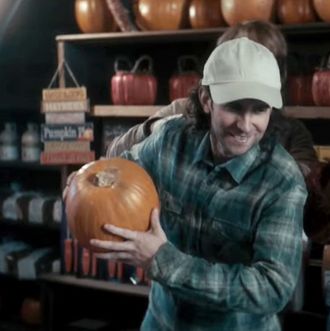
Saturday Night Live is certainly no stranger to accusations of plagiarism. The show came under fire in 2014 when it was accused by members of the Groundlings in Los Angeles of stealing their idea for the Tina Turner “River Sisters” sketch featuring host Sarah Silverman, and again in 2017, when Tig Notaro accused the show of basing its “Birthday Clown” sketch featuring host Louis C.K. on her 2015 short Clown Service. In both cases, the sketches were strikingly similar to each other, and Notaro particularly had solid reason to believe that SNL was aware of her work. On the other hand, parallel thinking happens all the time in comedy, like when two similar sketches about boarding an airplane aired on SNL and Key & Peele within a two-week period in 2013 and Peele said on Twitter, “Nobody freak out. It’s a total coincidence.”
Now, SNL is on the receiving end of new plagiarism accusations by a New York–based sketch group called Temple Horses, and the group has even had a lawyer send a statement to NBC about it. According to Variety, Temple Horses founders Nick Ruggia and Ryan Hoffman believe the show ripped off two of their old sketches for SNL pretapes that have aired over the past few months. The first, “Pumpkin Patch,” aired on SNL in October when Awkwafina hosted, and Ruggia and Hoffman claim the sketch plagiarized their own sketch, “Fucking a Pumpkin,” which they uploaded to YouTube back in 2014. The second, “Pound Puppy,” aired during Don Cheadle’s SNL episode last month, and Ruggia and Hoffman say it plagiarized their “Pet Blinders” sketch from 2011. Watch all four sketches for yourself below:
“Fucking a Pumpkin”
“Pumpkin Patch”
“Pet Blinders”
“Pound Puppy”
Ruggia and Hoffman’s lawyer sent a nine-page letter to NBC last month detailing the similarities between the sketches. In the case of the pumpkin sketch, the lawyer noted that both sketches feature a pumpkin-patch owner “who interacts with a group of men (and, in each case, only one woman),” “accuses them of having sexual desire for pumpkins,” and “berates the pumpkin ‘lovers’ on the basis that there are children around,” and the sketches end when “both groups are dismissed from the pumpkin patch.” In the case of the pet sketches, similarities highlighted by the lawyer include using “3 separate settings for pet-interruption, introducing the pet owners’ dilemma,” using “a dog’s eye view, and a reverse shot to introduce the problem,” introducing a product to “blind the animal to the sex act,” and including “an aggressive dog who barks at the owner in mid-gratification.” An NBC attorney reportedly told Ruggia and Hoffman’s lawyer that an internal investigation found that the SNL writers “had independently developed the ideas for those sketches and found no similarities to the Temple Horses sketches that would be protected by copyright law.”
“Imagine, one day you come home and it looks like somebody’s robbed your house. What do you want from that situation? We feel like somebody took our stuff, and this isn’t the kind of thing where you can just get it back or call your insurance company to have it replaced, so at this point we’re just speaking out about it,” Hoffman told Variety about the sketches. The duo said they initially decided to “let it go” after the “Pumpkin Patch” sketch aired, but after they saw the similarities in “Pound Puppy,” they changed their mind: “We don’t really want to be involved in a mess like this, but there’s a certain point you have to stand up for yourself and your work.”
To be fair to SNL, while the sketches do share some basic things in common, they aren’t exactly the same. SNL’s pumpkin sketch centers on employees at a pumpkin patch who are ultimately fired for having sex with the pumpkins the night before, and the Temple Horses sketch follows customers at a pumpkin patch who are trying to find the most fuckable pumpkin. When it comes to the pet sketches, SNL’s solution to the awkwardness of having a dog in the bedroom while a couple has sex is to put the couple into a giant dog-shaped contraption so the dog can’t see them, while Temple Horses proposes putting an eye mask on the dog. Both concepts have been explored before in comedy and pop culture, as writers Heather Anne Campbell and Katy Stoll pointed out for “Pumpkin Patch” and Vulture has outlined before for awkward pet-in-the-room sex:
While it’s not impossible that SNL may have lifted ideas from Temple Horses for these sketches, the show would certainly never admit to that (they have denied much more compelling plagiarism accusations in the past), and Ruggia and Hoffman’s lawyer’s argument that SNL engaged in “wholesale lifting of concept, setting, characters, plot, and outcome in the same season” is at best debatable. In the case of SNL’s “Pumpkin Patch,” at least two pumpkin-fucking-themed sketches that are older than Temple Horses’ “Fucking a Pumpkin” have already been unearthed, and prior to Variety’s coverage, the “Pet Blinders” sketch had less than 5,000 views on YouTube, which makes it even tougher to believe that an SNL writer would turn to a video uploaded nearly eight years ago for sketch ideas. A source at SNL also told Variety that both of the SNL sketches in question were written by different writers, so there’d have to be not one but two SNL writers who decided to steal from the same sketch group that has less than 4,000 YouTube subscribers within a five-month period.
Even if it’s against a powerful institution like SNL, comedians absolutely should stand up for their work when they feel it has been plagiarized, but there are several questions they should ask themselves first before publicly accusing other comedy writers of theft, which is outlined in our handy guide:
• Is it likely that they saw your joke?
• Is your joke highly original?
• Is your joke topical and obvious?
• Are you sure they — or someone else — didn’t make the joke first?
• Is the new version very similar, or does it only share some specifics?
• Does it make sense that they’d steal your joke?
Unlike, for instance, Tig Notaro’s accusations against SNL and host Louis C.K., these questions are where Temple Horses are going to run into trouble when it comes to legal arguments and general reactions by comedy fans. Word-for-word plagiarism is one thing, but comedians often play around with similar ideas, and it doesn’t seem too out of the ordinary that, for example, four Halloween lead-up sketches exist about pumpkin-fucking. To use another example, is it weird that CollegeHumor uploaded a commercial parody called “Visiting Your Crappy Hometown” in 2017 that is nearly identical to SNL’s 2012 commercial parody “Your Hometown”? Yes. Is it possible that CollegeHumor stole a sketch idea from SNL despite the risk of being called out for it? Sure. Is it more likely that visiting your boring, depressing hometown to see your parents or spend the holidays is a universally relatable idea for many millennial Americans who both write and watch comedy videos, and it’s inevitable it would be explored by different comedians in similar ways? Probably.





